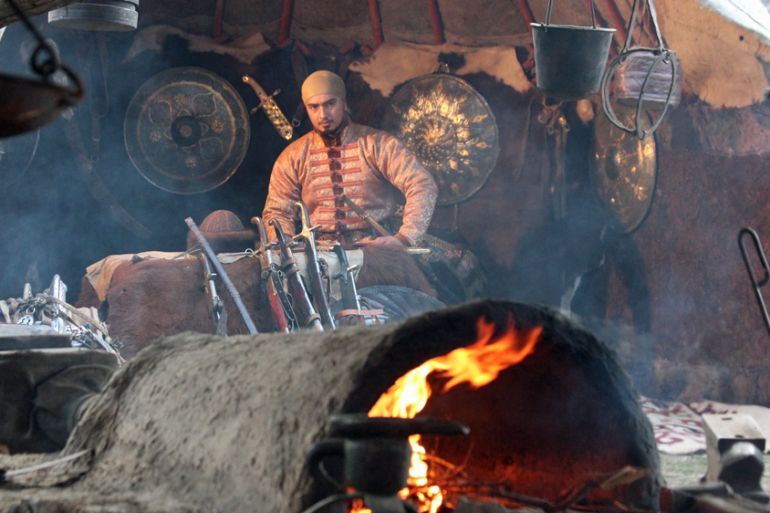New Kazakh TV series a riposte to Putin and Borat
Upcoming television series depicts the warlike Central Asian nomads who fought over remnants of the Mongol Empire.

Two things inspired a forthcoming television series about the warlike Central Asian nomads who fought over the remnants of the Mongol Empire to carve out what is now known as Kazakhstan.
The first is Game of Thrones, HBO’s blockbuster saga based on George RR Martin’s fantasy novels, whose mix of violence, realism, and magic made it one of the most successful series in history.
Keep reading
list of 4 itemsInside the pressures facing Quebec’s billion-dollar maple syrup industry
‘Accepted in both [worlds]’: Indonesia’s Chinese Muslims prepare for Eid
Photos: Mexico, US, Canada mesmerised by rare total solar eclipse
The second source of inspiration is more political and poignant. It is Russian President Vladimir Putin’s offensive remark about the roots of statehood in Kazakhstan – the world’s ninth-largest country with immense hydrocarbon reserves, endless steppes, and a population of fewer than 18 million people.
Putin said in 2014 – just months after Moscow’s annexation of Crimea and the beginning of hostilities in eastern Ukraine – that Kazakhs “had never had statehood” before the 1991 Soviet collapse.
He also ominously hinted the nation ruled by ageing President Nursultan Nazarbaev could lose part of its territory the way Ukraine did – nearly one-quarter of Kazakhstan’s citizens are ethnic Russians concentrated in the north, close to Russia.
|
|
| Genghis Khan’s legacy lives on in Mongolia |
The remark prompted renowned Kazakh producer and actor Arman Asenov to develop a 20-episode series describing the beginning of the Kazakh khanate in the middle of the 15th century.
“We thought that if even the head of a neighbour state, a brotherly state, does not know that our history spans 550 years, then average people are less likely to know, and we have to tell them about our history,” Asenov told Al Jazeera.
The emergence of an independent Kazakh state was spurred on by the disintegration of the Golden Horde, one of the most powerful Mongol states which occupied huge swaths of Eastern Europe, southern Russia, and Central Asia.
“Historically speaking, this is similar to the [1991] Soviet collapse,” Asenov said.
A dynasty of descendants of Genghis Khan ruled Kazakhs, a confederation of Turkic-speaking nomadic tribes, until czarist Russia absorbed the Kazakh steppes by the mid-19th century.
Asenov said his series would be among the most “spectacular” cinematic events in the former Soviet Union because of epic battle scenes and vivid imagery. It will premiere later this year in Kazakhstan, which is celebrating the 25th anniversary of its independence.
Film companies from Russia, Turkey, and China – where Genghis Khan is celebrated as an important historic figure – showed interest in the series, Asenov said.
Irrespective of international success, the TV series is secured from flopping at home – because President Nazarbaev is listed as the “author of the film’s idea”. Mostly state-funded, the series was directed by filmmaker Rustem Abdrashev, known for his four-part cinematic biography of Nazarbaev.
Nazarbaev, credited for turning oil-rich Kazakhstan into one of the most prosperous post-Soviet nations, has also been criticised for his heavy-handed policies and a crackdown on critics and opposition.
Overcoming Borat
The series is part of Kazakhstan’s efforts to boost film production following the 2010 nomination of a Kazakh movie for the best foreign-language film Academy Award. The dialogue-free film, titled Daughter-in-Law, was panned by Kazakh critics for a bestiality scene.
|
|
| Oil price slump hits Kazakhstan hard |
Despite lavish funding, the outcomes are often mixed critically and financially. Many state-funded projects flopped, while independent, art-house film-makers get little or no funding despite their success at international film festivals, Borisova said.
Another problem is corruption around many state-funded projects that involve pilfering of budgets, an industry insider claimed.
“They understand that in the country with a population of 18 million, with just a small percentage of potential viewers, an expensive – according to the country’s standards – project will never return the investment. That is why one has to profit from the government-allocated budget, because no other profit is expected,” said the insider, who asked to remain anonymous because his work involves state-funded projects.
There was another movie that made Kazakhstan world-famous in an extremely peculiar way.
The 2006 comedy starring Sasha Baron Cohen who played Borat, a fictional Kazakh journalist discovering the United States, angered many Kazakhs.
The comedy – filmed in Romania and the US – portrayed Kazakhs as anti-Semitic bigots, rapists, and paedophiles. Kazakh officials denounced and banned the film, although later some thanked Cohen for boosting the number of foreign tourists.
Producer Asenov has another solution for the Borat problem.
“We’d love to invite Cohen as a promoter or co-producer” of the TV series, he said with a laugh.
![The emergence of an independent Kazakh state was spurred on by the disintegration of the Golden Horde, one of the most powerful Mongol states [Courtesy: Kazakhfilm] [Al Jazeera]](/wp-content/uploads/2016/02/fb0c1d80f21348c8b697349be42eaa6a_18.jpeg)